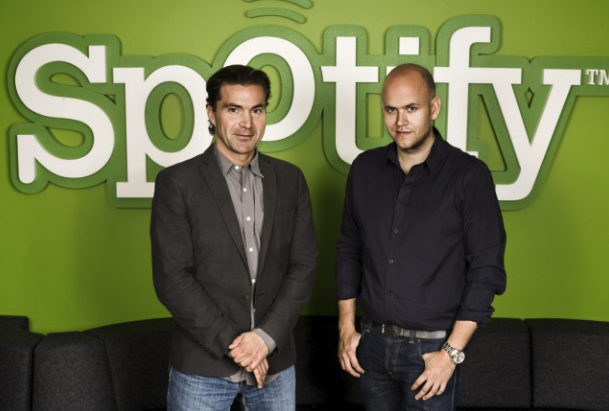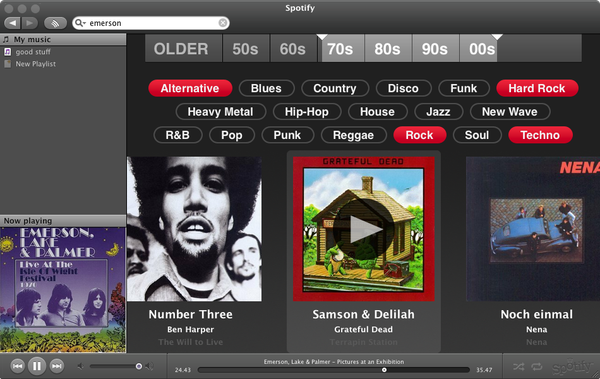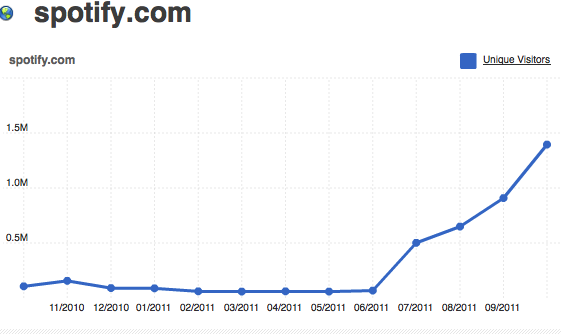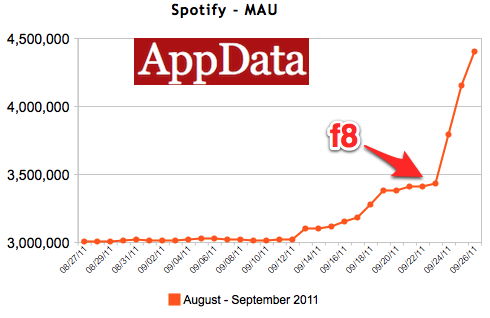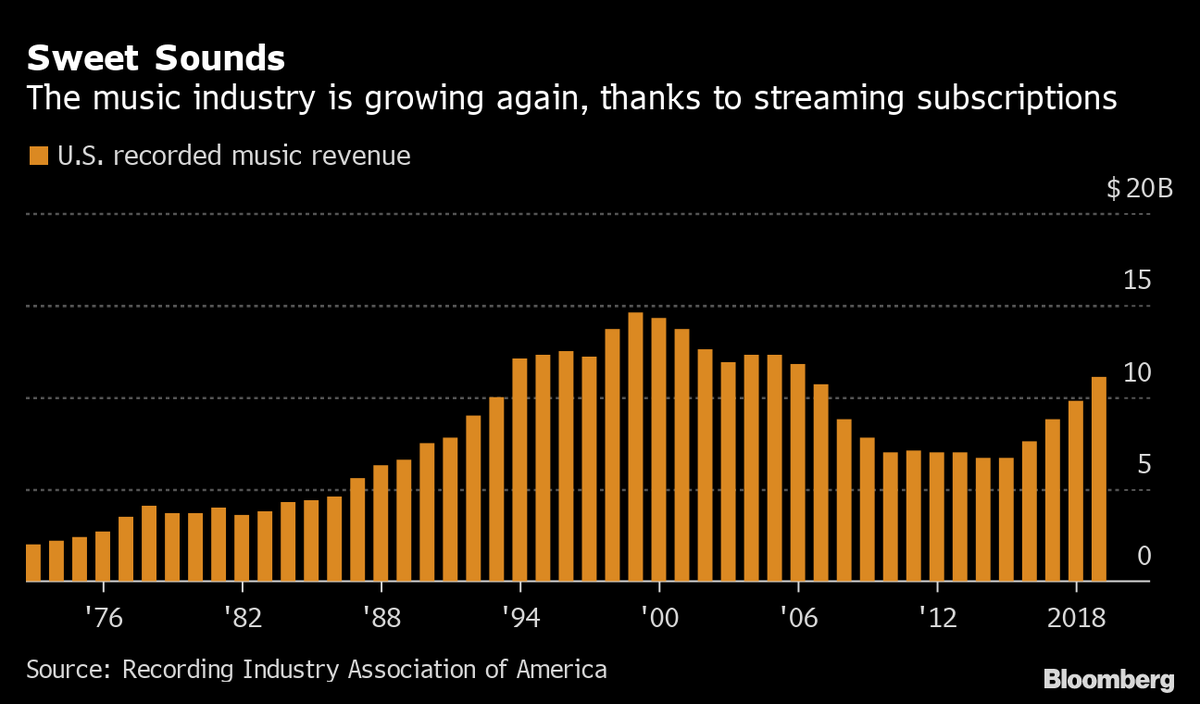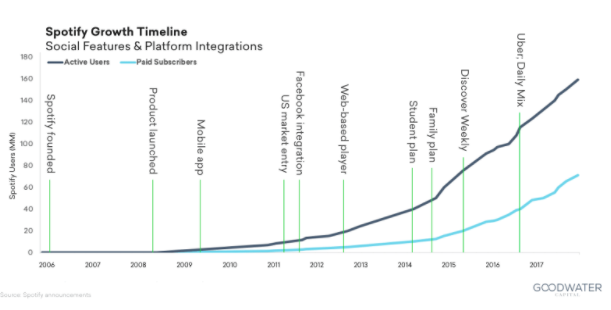@Spotify is today’s ubiquitous music provider and one of Europe’s biggest tech companies.
• €1.89b in revenue
• 299m monthly active users
• 138m subscribers
• 60m songs
• 1.5m podcasts
This is the story of how two Swedish entrepreneurs changed audio.
(Megathread)
• €1.89b in revenue
• 299m monthly active users
• 138m subscribers
• 60m songs
• 1.5m podcasts
This is the story of how two Swedish entrepreneurs changed audio.
(Megathread)
@eldsjal (Spotify’s co-founder and CEO) came up with the idea in 2002 when the file sharing software Napster stopped working and was quickly replaced by another similar site, Kazaa.
What was this epiphany about? Piracy.
What was this epiphany about? Piracy.
"I realized that you can never legislate away from piracy. Laws can definitely help, but it doesn't take away the problem. The only way to solve the problem was to create a service that was better than piracy and at the same time compensates the music industry" – Daniel Ek
A few years later, Ek met his now co-founder Martin Lorentzon, a former co-founder of TradeDoubler. Together, they discussed a lot of ideas but settled for the one that would become the service we know and love today.
In 2007, Spotify’s private beta opened for friends, family, and music bloggers. Initial traction came from hype and anticipation surrounding the launch of a new service.
In October 2008, Spotify officially launched in the UK, Germany, France, Italy, Spain, Finland, Norway, and Sweden in October with a $21.6m Series A from Li Ka-Shing, @NorthzoneVC, @Creandum and Horizon Ventures.
After the initial hype, Spotify kept going. In early 2009, Spotify announces 1 million users.
Why? A fantastic product that beat out existing players on every vector:
• music catalogue
• product features
• pricing model
• user choice
• legality
Why? A fantastic product that beat out existing players on every vector:
• music catalogue
• product features
• pricing model
• user choice
• legality
A big part of the success is the unlimited music catalogue. By 2010, they had over 10m tracks (iTunes had 11m.)
But how the hell did Spotify get its music? In 2008, record labels were going through terrible times and Ek leveraged the fact that they had nothing to lose.
But how the hell did Spotify get its music? In 2008, record labels were going through terrible times and Ek leveraged the fact that they had nothing to lose.
In exchange for about 1/5 of Spotify’s stock, major labels granted Spotify distribution rights for their ENTIRE catalog for use on a limited basis.
• Sony → 6%
• Universal → 5%
• Warner → 4%
• EMI → 2%
• Merlin → 1%
• Sony → 6%
• Universal → 5%
• Warner → 4%
• EMI → 2%
• Merlin → 1%
And so the growth continued. By March of 2011, Spotify had grown to 6.67 million users (+ 1 million paid subscribers).
Then came the US launch.
Just as they had in Europe, Spotify leveraged momentum, bloggers and influencers to gain PR and generating hype.
Then came the US launch.
Just as they had in Europe, Spotify leveraged momentum, bloggers and influencers to gain PR and generating hype.
Here's Asthon Kutcher back in 2011: https://twitter.com/aplusk/status/91558347609866241?s=20
Spotify launched paid and invite-only free accounts in the US on July 14, 2011, and US users piled onto the site to subscribe or sign up for an invitation.
The tipping point was Facebook’s f8 developer’s conference where the social network announced a new partnership Spotify to be the "default" music provider.
This would allow Spotify to publish listening, reading, and viewing activity to users' timelines.
This would allow Spotify to publish listening, reading, and viewing activity to users' timelines.
This was all made possible by one key technical detail: within Spotify, each track, album, and playlist has a unique URL.
This wasn't a thing before. Files were stored locally and sharing them was a pain in the ass.
This wasn't a thing before. Files were stored locally and sharing them was a pain in the ass.
Spotify's success is not just a catalogue and social sharing. The product and vision were unique – all the music in the world, anywhere, anytime, for a few dollars.
The difference is whether you shrink or expand a market. Both are profitable but fundamentally different.
The difference is whether you shrink or expand a market. Both are profitable but fundamentally different.
iTunes was a market shrinker. They lowered prices and took revenue from players like Tower Records, making the market smaller.
Spotify is a market expander. The big bet is they can increase the market of new listeners (or return those lost to piracy) through a freemium model.
Spotify is a market expander. The big bet is they can increase the market of new listeners (or return those lost to piracy) through a freemium model.
But all change brings forth controversy, and Spotify wasn’t about to be the exception.
One famous example was that of Taylor Swift’s album ‘1989’. A week before its launch, Swift pulled her entire catalog off of Spotify.
One famous example was that of Taylor Swift’s album ‘1989’. A week before its launch, Swift pulled her entire catalog off of Spotify.
This, of course, was quickly seen as a critical loss for the Swedish company. But it was the opposite.
Each time a high-profile artist got into a public feud with Spotify over royalties, there was media. And, as @ryanholiday would say, controversy is the best kind of media.
Each time a high-profile artist got into a public feud with Spotify over royalties, there was media. And, as @ryanholiday would say, controversy is the best kind of media.
Not only that but also… well, those artists were wrong.
Spotify may have not helped each and every individual artist but… as @nbashaw explained in his newsletter, Spotify’s bundling of music helped the music industry as a whole.
A lot. https://divinations.substack.com/p/bundle-magic
Spotify may have not helped each and every individual artist but… as @nbashaw explained in his newsletter, Spotify’s bundling of music helped the music industry as a whole.
A lot. https://divinations.substack.com/p/bundle-magic
Two years after Spotify’s launch, the music industry was already growing again, and worth $17 billion.
Just last year, Goldman Sachs predicted streaming alone would be worth $37.2 billion by 2030.
Just last year, Goldman Sachs predicted streaming alone would be worth $37.2 billion by 2030.
Let’s compare that chart to Spotify’s growth.
By 2010, Spotify had 250,000 subscribers, 5% of which paid for the premium service.
Daniel Ek said: "I'm absolutely convinced we will have millions of paying subscribers within the next couple of years." He was not wrong.
By 2010, Spotify had 250,000 subscribers, 5% of which paid for the premium service.
Daniel Ek said: "I'm absolutely convinced we will have millions of paying subscribers within the next couple of years." He was not wrong.
Let’s look at some numbers again.
The day Spotify finally went public (April 3, 2018), its stock was worth $147.92. On May 15th, 2020, the number was $158.83.
Yesterday it closed at $256,80, with a peak of $278.24 on July 10th, 2020. What happened?
The day Spotify finally went public (April 3, 2018), its stock was worth $147.92. On May 15th, 2020, the number was $158.83.
Yesterday it closed at $256,80, with a peak of $278.24 on July 10th, 2020. What happened?
First, the pandemic
According to the last quarterly earnings, the lockdown didn't affect Spotify that much and it is now fully recovered. https://twitter.com/gonsanchezs/status/1288595558849019912
According to the last quarterly earnings, the lockdown didn't affect Spotify that much and it is now fully recovered. https://twitter.com/gonsanchezs/status/1288595558849019912
But most importantly, podcasting: Spotify is pushing to own audio, and podcasting is a huge part of that.
On May 22nd Spotify paid Joe Rogan a reported $100 million in exchange for distribution rights of his podcast.
But why? Why make the move to podcasts?
On May 22nd Spotify paid Joe Rogan a reported $100 million in exchange for distribution rights of his podcast.
But why? Why make the move to podcasts?
As @brettbivens discusses in “Spotify: The Ambient Media Company”, Spotify needs to make “an aggressive push to move beyond music” if they want to survive their competitors. https://twitter.com/brettbivens/status/1220672011543941123?s=20
Spotify is, essentially, a marketplaces where the supply side (record labels owning catalogues) is ungrateful, unpredictable, and revenge-seeking.
On Spotify’s competitors, @brettbivens writes: “(they) see their digital music businesses as a complement to their primary raison d'être and are aggressively seeking to commoditize it."
The perfect example is iTunes and Apple Music. They don't mind giving it away for cheap.
The perfect example is iTunes and Apple Music. They don't mind giving it away for cheap.
But for Spotify it's existential.
For every song streamed, Spotify needs to pay 70% to labels. But not for podcasts.
Owning audio is great. But owning audio where you get increasing returns to scale because you don't pay royalties linearly is MUCH better.
For every song streamed, Spotify needs to pay 70% to labels. But not for podcasts.
Owning audio is great. But owning audio where you get increasing returns to scale because you don't pay royalties linearly is MUCH better.
Because it's existential, they are moving aggressively. The biggest podcaster in the world is just one (small) piece of the puzzle.
Podcast creation tools → Anchor, Loudr
Original content → Gimlet, The Ringer, Parcast
Licensing deals → Joe Rogan, Michelle Obama
Podcast creation tools → Anchor, Loudr
Original content → Gimlet, The Ringer, Parcast
Licensing deals → Joe Rogan, Michelle Obama
Music ends up being the loss leader, and podcasts are monetized via increased engagement (which leads to more subscriptions and less churn) and Streaming Ad Insertion. https://twitter.com/gonsanchezs/status/1288595566109372426?s=20
On Masters of Scale, Ek told @reidhoffman: “I had this ... product I wanted to see in the world. I told my team, ‘If we can create the feeling that people have all the world’s music we'll have built something that’s much better than piracy.'"
But that was just the start.
But that was just the start.

 Read on Twitter
Read on Twitter